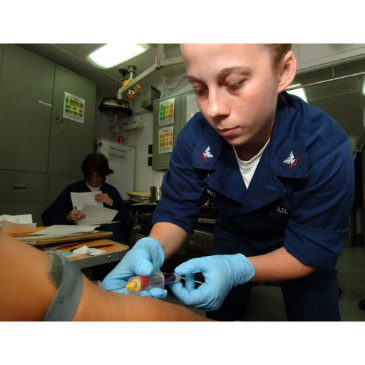In Colorado, if you are suspected of driving under the influence of alcohol or drugs, you are required to be given an Express Consent Advisement. CRS 42-4-1301.1 states that a person suspected of driving under the influence shall be required to “take and complete, and to cooperate” in the taking of a test of the person’s breath or blood to determine their alcohol content. While a person can refuse a chemical test, a refusal comes with serious consequences. Most people choose a chemical test of their blood. This article will focus on what constitutes a valid blood test.
When Can a Test Be Done?
 While a blood test for alcohol sounds relatively straightforward, when being done for evidentiary purposes, they are anything but. For a blood test in a DUI setting to be legally sound, it must conform to several statutory and regulatory requirements.
While a blood test for alcohol sounds relatively straightforward, when being done for evidentiary purposes, they are anything but. For a blood test in a DUI setting to be legally sound, it must conform to several statutory and regulatory requirements.
To qualify as a valid test, CRS 42-4-1301.1 requires the following:
- The test must be completed within 2 hours of driving,
- The blood must be drawn by a physician, registered nurse, emergency medical service provider, or a person whose normal duties include withdrawing blood samples under the supervision of a physician or registered nurse (such as a phlebotomist), and
- The person whose blood is being drawn must consent to the blood draw.
What Regulations Must It Adhere to?
Additionally, the blood draw itself must conform to very specific Colorado Department of Public Health and Environment regulations. These regulations are contained in the Code of Colorado Regulations, 5 CCR 1005-2. These regulations mandate a blood draw must be:
- Collected in the presence of the arresting officer or another responsible person who can authenticate the specimens,
- Collected and labeled according to the instructions in the blood kit,
- Collected by a physician, nurse, paramedic, emergency medical technician, medical technologist, or a person whose normal duties include collecting blood specimens,
- Collected at an appropriate clinical or public safety facility,
- Collected using sterile equipment,
- Collected after the area of skin is cleansed and disinfected with an aqueous solution of nonvolatile antiseptic. Alcohol cannot be used as a disinfectant,
- Collected directly into two 10ml sterile tubes set to draw at least 10ml and containing sodium fluoride and potassium oxalate,
- Mixed according to the instructions in the blood kit,
- The blood kit must be approved for use and not have passed its expiration date,
- Identified with the subject’s name and evidence seal,
- Placed in a secured storage unit until shipped to the lab,
- Refrigerated at or below 46.4 degrees Fahrenheit and not frozen,
- Whenever possible shipped to a lab within 7 days of collection.
Once the blood is collected, it must be:
- Tested by a certified laboratory (in Colorado, the Colorado Bureau of Investigations toxicology lab performs the tests),
- Tested in a reasonable amount of time,
- If a positive test is returned, the blood must be tested a second time, and
- Stored in a refrigerator at or below 46.4 degrees Fahrenheit for 12 months.
The second vial must be retained for testing by the defendant.
If any of these requirements are missed, the validity of the blood draw is suspect and can be attacked when defending a DUI. The attorneys at The Bussey Law Firm, P.C. analyze evidence such as the officer’s reports, the body cam footage, the consent affidavit, the qualifications of the person performing the blood draw, the test result, and the chain of custody of the blood to evaluate whether a blood draw is legally sound.
We Can Help
If you have been arrested for DUI and consented to blood draw, you need an experienced attorney to determine whether the blood draw conformed to Colorado’s strict statutory and regulatory requirements. The attorneys at The Bussey Law Firm, P.C. are experienced in attacking each of the requirements above. Contact us at (719) 475-2555 for a free consultation.
